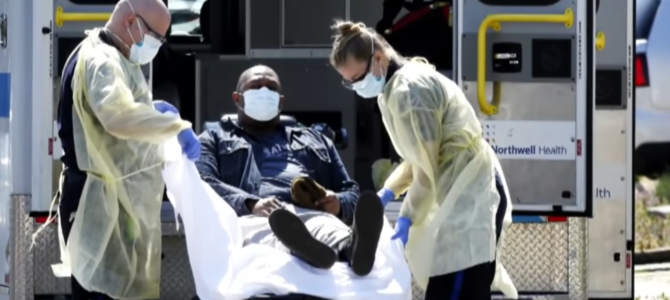Over the past few days, especially in New York City, the epicenter of the coronavirus outbreak there has been some good news. Cases are slowing and the long sought after flattening of the curve may be upon us. While this is and should be cause for at least cautious optimism, in the year 2020 with Donald Trump in the White House, good news can never really be good news. So how is it being tempered? How else? With that old standby, racism.
This is not the first time that racism has worked its way into our conversations about the virus. A few weeks ago, after having used the term “Wuhan virus” liberally for over a month, it was decided by progressives and many in the media that using the term was the rhetorical equivalent of donning a white hood and burning crosses. The new question surrounding race is different, it is focused squarely on disproportionately poor medical outcomes for many black Americans.
The first thing that should be said is that the outsized number of deaths in the black community is a very real and very serious issue that points to our nation’s great failures in serving that community for decades. Both in terms of lack of medical care, and predominance in preexisting conditions like diabetes, which Black Americas have had subpar outcomes for generations. The virus is exacerbating that situation.
These are problems that must be addressed, which in fact our society has tried and failed to address for decades. Over the past couple of days the racial disparity has become a major story in newspapers, on cable news, and was even talked about by President Donald Trump and his medical experts during Tuesday night’s White House Task Force press conference.
While disparities in the black community, not just medical, but economic and educational as well need to be dealt with in the long term, it is wrong to make it a focus of our immediate response to the coronavirus, which of late is looking to be very effective. The mantra on both the federal and state level during this crisis has been to get medical professionals and supplies to where they are needed as fast as possible.
This has been achieved by looking at testing, hospital rates, models and an abundance of other tools that need not and should not take race into account. If a hospital in Detroit needs ventilators we send it ventilators. We don’t take a census of the patients to ensure some kind of demographic equality. This crisis truly is a case where we must treat all people as equal; we must protect Americans as individual human beings, not as avatars of demographic groups.
In some sense this focus on race just as we seem to turn a corner on the virus is a perfect example of the progressive need for American self-flagellation. No matter the problem or issue, the left will find a way to make America’s wicked history of systemic racism the original sin at the bottom of it. Sure, the virus started in China, but the havoc it is wreaking must somehow lie at the feet of evil America.
Put simply, this is not the time. This is a time when all Americans must come together; our lives are literally in each other’s well-washed hands. Seeking to divide Americans at this crucial moment is blatantly wrongheaded. Of course, when we emerge from the shadow of the virus all of our previous problems will still be with us. But first we must emerge.
The lesson of the coronavirus pandemic is that no group is safe, no matter what continent they are on, what religion they practice, or what color their skin is. Americans across the demographic spectrum have stepped up to the task of keeping our country safe. This is something to celebrate together, not an opportunity to condemn our historical and current racial issues.
There will soon be a time for lessons, noting things we got right in fighting the virus, and examining the things we got wrong. At that time, the racial disparities, which long predated the virus must be interrogated; better answers must be arrived at. But we aren’t there yet. For now we are still fighting the virus, not the social ills it lays bare. Until that fight is over, we must not be distracted by our society’s moral failings, but fully focused on saving lives and bringing a vibrant economy for all Americans back to life.









